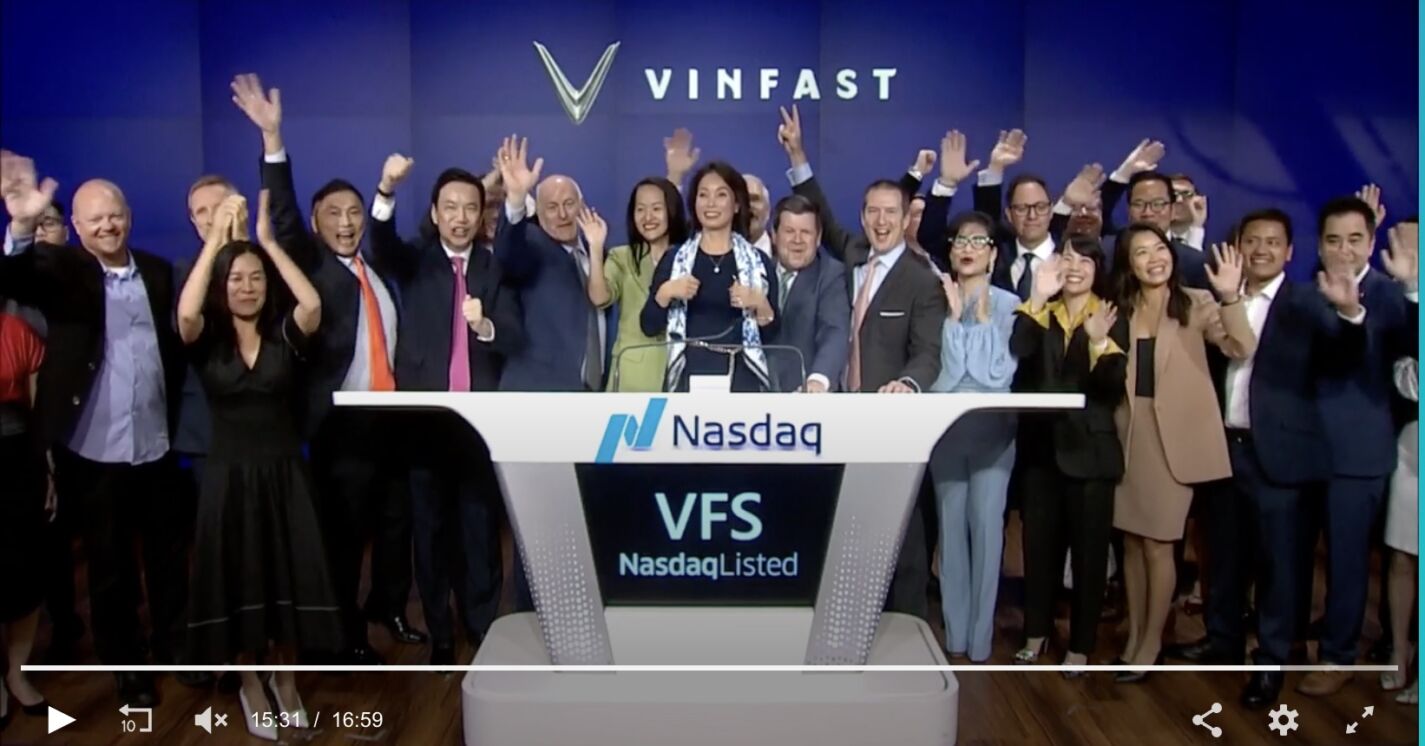VinFast, the electric vehicle maker with plans to open a $4 billion manufacturing plant in Chatham County in 2025, has sold 11,300 vehicles during the first half of 2023. While that would usually be good news, here’s the kicker: more than half, 7,100, were sold to itself.
Barron’s first reported the news after a filing by the company with the Securities and Exchange Commission was released Tuesday.
The 7,100 EVs were bought by Green and Smart Mobility, a Vietnamese taxi company controlled by Vingroup, owners of VinFast.
It’s not the first time the relatively new company needed some help being propped up.
When VinFast began trading on the Nasdaq last month, there were the standard cheers and excitement for the Vietnamese electric vehicle maker, a move made possible when Black Spade Acquisition Company shareholders agreed to approve the merger with VinFast.

VinFast executives ring the bell on the Nasdaq for the first day of trading, August 15, 2023. Source: Nasdaq.com.
The company’s stock valuation rocketed past Ford and General Motors (GM) on its first day of trading, closing above $37 a share, giving it a stock valuation of $85 billion, compared to Ford’s $48 billion and GM’s $46 billion. Shares continued to climb to a peak of $82.35 on Aug. 28, with a valuation of $190 billion.
But the rally was short-lived, with shares closing at $17.21 on Tuesday.
Many news outlets, including Jalopnik.com, point to a single reason for the volatility of the stock – stock ownership.
Only 0.3% of the stock is currently available to trade.
Vingroup VIC and Vingroup’s former chairman Pham Nhat Vuong, controls the remaining 99.7%. He owns about 51% of Vingroup stock and currently serves as the board chairman at VinFast, according to Barron’s.
According to Jalopnik, about 1.2 billion of VinFast’s 2.3 billion shares outstanding are held by Vingroup, and another 1.1 billion shares are held directly by Vietnam Investment Group, which lists Vuong as the sole shareholder, and Asia Star, another investment entity controlled by Vuong.
The Wall Street Journal also states the recent crash in the shares of VinFast serves as a warning of the latest trend of Special Purpose Acquisition Companies or SPACS that ends with “everyday investors getting burned.”
The WSJ explains that “unlike with traditional initial public offerings, SPAC deals let companies make lofty business projections and draw in individual investors before mergers are completed. Anyone can buy shares of the shell firm before it combines with the target company, making the deals more accessible than IPOs, which are typically limited to professional investors before listings are complete.”
According to SPAC Research, the move has led to shares of about 400 companies that went public through SPACs since 2020 to fall more than 55% on average. Many have filed for bankruptcy or been taken private at much lower valuations.
The company hasn’t had the greatest luck with its finances or introduction into the U.S. market.
The company reported in June that it lost $598 million, or 49%, in the first quarter of this year.
According to Reuters, the company attributed the quarterly revenue decline of almost $84 million to lower selling prices and its phase-out of internal combustion vehicles as it pivoted to become a dedicated EV maker.
The company has been hemorrhaging money for some time now, losing $2.1 billion in 2022 and $1.3 billion the year prior.
The National Highway Traffic Safety Administration (NHTSA) issued a recall in May of all 999 VF8 2023 vehicles sent to the U.S. due to safety concerns.
The recall was due to a multifunction head unit display caused by a software error that may cause it to go blank while driving, increasing the chances of a crash. The error was talked about in-depth in many critical reviews.
Lofty Goals
The groundbreaking of the EV manufacturing plant in Triangle Innovation Point, Moncure, Chatham County, held July 28, is the company’s first entry into the U.S. vehicle market (It will also be North Carolina’s first auto manufacturing plant), but it won’t be VinFast’s last foray into building manufacturing plants outside of its native Vietnam.
The company has set its sights on expanding to other countries, including Indonesia, with the goal of building a plant there in 2026. The country is especially attractive given its high nickel composition, a key component of EV batteries.
Reports say the company plans to invest around $1.2 billion in the Indonesian market in the long term, of which $200 million would be reserved for the plant, according to its latest filing to the SEC.
Reuters also reports that VinFast, which hasn’t made a profit yet, plans to create a presence in India, Malaysia, the Middle East, Africa, and Latin America and expand its presence in Europe as it identified between 40 and 50 potential markets.
The company also intends to raise capital from global investors over the next 18 months.